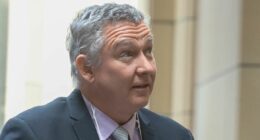Share this @internewscast.com
The federal government is urging the Fair Work Commission to implement pay increases for nearly three million workers to counteract the impacts of inflation on prices.
Today, the Australian Government presented a submission for the annual wage review, suggesting that “the Commission grant an economically sustainable real wage increase to Australia’s award workers.”
Treasurer Jim Chalmers stated, “This is all about ensuring that three million Australians can obtain the fair pay they need and deserve to support their families.”

The government also argued that economic conditions had “turned a corner,” making it safe to increase wages, with inflation moving into the target range set by the Reserve Bank of Australia.
They said that along with low unemployment figures released yesterday, interest rates were falling.
“Low-paid workers and their families are particularly affected by cost-of-living pressures, because they typically have limited liquid asset buffers to draw on to cover rising costs and they are less able to deal with unexpected expenses,” the government said.
The government also said this increase would help narrow the gender pay gap, which currently sits at 11.9 per cent on weekly wages.
But business groups say it’s not just workers who are doing it tough.Â
“It’s very easy for a politician in Canberra to decree that there should be higher salaries and higher wages,” Council of Small Business Organisations spokesperson Luke Acherstraat said.
“But who foots the bill? It’s small businesses, the mums and dads, many of whom are struggling.
“Small businesses will need to pass these costs on.”

Economists say any wage increases need to come with better productivity, or it could push prices up.
“Any wage growth that is significantly in excess of growth of labour productivity will lead to higher inflation and probably higher unemployment as a result, neither of which are things that we want to see,” Economist Saul Eslake said.
Australia’s productivity has been sluggish in recent years, worry economists about the nation’s future prospects.











